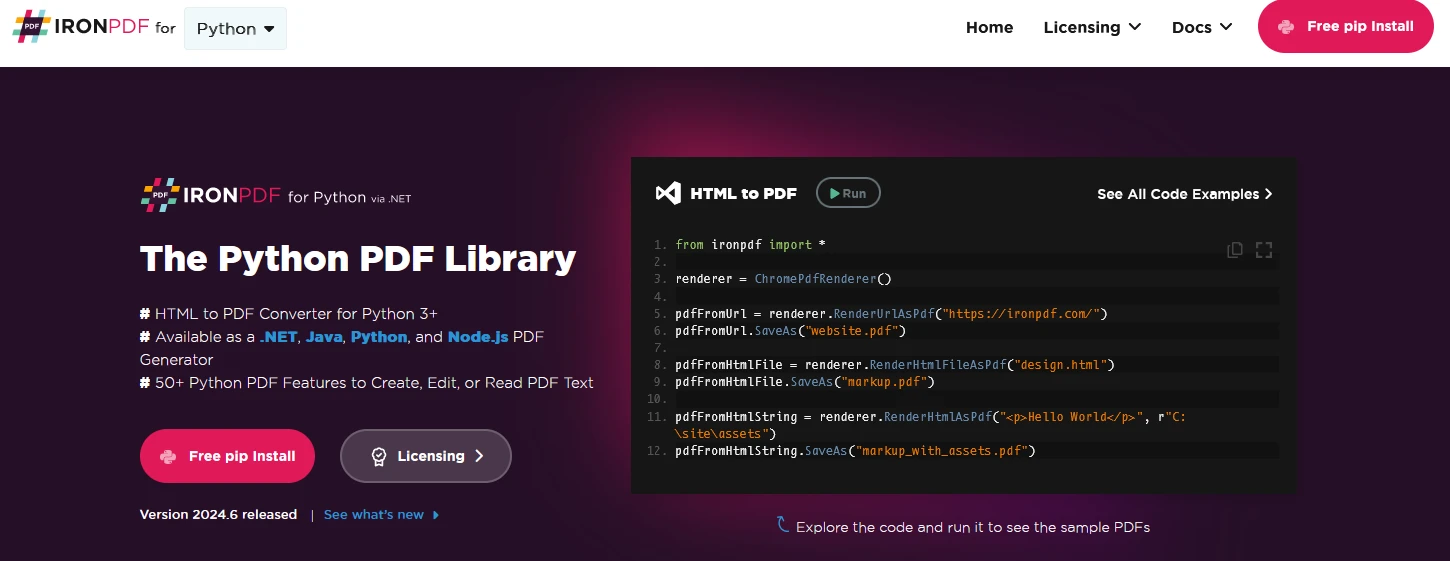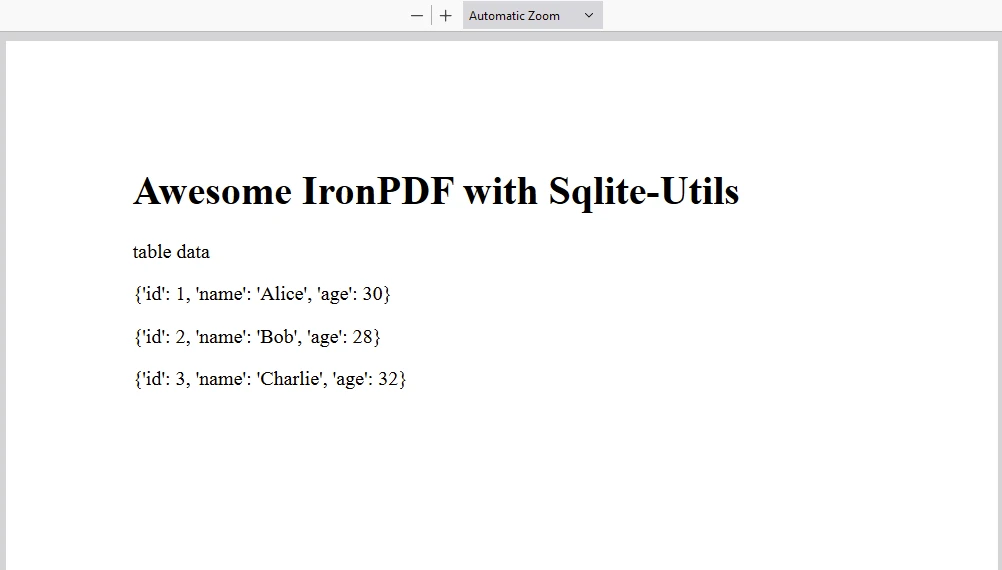Test in production without watermarks.
Works wherever you need it to.
Get 30 days of fully functional product.
Have it up and running in minutes.
Full access to our support engineering team during your product trial
The SQLite-utils Python package is a versatile tool that contains Python utility functions for working with SQLite databases. It provides a command-line interface (CLI) and a Python library, making it easy to create, manipulate, and query SQLite databases. Let's dive into its features and see some code examples. Later in this article, we will explore IronPDF, a PDF generation library developed by Iron Software.
SQLite-utils is designed to simplify various tasks related to manipulating SQLite databases. Some of its key features include:
You can install SQLite-utils using pip:
pip install sqlite-utilsOr, if you use Homebrew on macOS:
brew install sqlite-utilsThe CLI tool allows you to perform various operations directly from the command line. Here are some examples:
Let's create a new SQLite database and insert some data from a CSV file:
# Create a new database and insert data from a CSV file
sqlite-utils insert dogs.db dogs dogs.csv --csvThe command below is how you would do an SQL query from the database:
# Query the database and display results in JSON format
sqlite-utils dogs.db "select * from dogs" --jsonList all tables in the database along with their row counts:
sqlite-utils tables dogs.db --countsYou can also use SQLite-utils as a Python library to interact with SQLite databases programmatically.
Here's how to create a new database and insert data using Python:
import sqlite_utils
# Create a new database
db = sqlite_utils.Database("demo_database.db")
# Insert data into a table
db["dogs"].insert_all([
{"id": 1, "age": 4, "name": "Cleo"},
{"id": 2, "age": 2, "name": "Pancakes"}
], pk="id")You can run SQL queries and fetch results:
# Run a query and fetch results
rows = db.query("SELECT * FROM dogs")
for row in rows:
print(row)Enable full-text search on a table and search queries:
# Enable full-text search
db["dogs"].enable_fts(["name"])
# Run a search query
results = db["dogs"].search("Cleo")
for result in results:
print(result)
IronPDF is a powerful Python library designed to create, edit, and sign PDFs using HTML, CSS, images, and JavaScript. It offers commercial-grade performance with a low memory footprint. Key features include:
HTML to PDF Conversion:
Convert HTML files, HTML strings, and URLs to PDFs. For example, render a webpage as a PDF using the Chrome PDF renderer.
Cross-Platform Support:
Compatible with various .NET platforms, including .NET Core, .NET Standard, and .NET Framework. It supports Windows, Linux, and macOS.
Editing and Signing:
Set properties, add security with passwords and permissions, and apply digital signatures to your PDFs.
Page Templates and Settings:
You can customize PDFs with headers, footers, page numbers, and adjustable margins. It additionally supports custom paper sizes and responsive layouts.
Standards Compliance:
Complies with PDF standards, including PDF/A and PDF/UA, supports UTF-8 character encoding, and manages assets such as images, CSS, and fonts.
import sqlite_utils
from ironpdf import *
# Apply your license key
License.LicenseKey = "key"
db = sqlite_utils.Database("mydatabase.db")
# Define a table schema
schema = {
"id": int,
"name": str,
"age": int
}
# Create a table
db["users"].create(schema)
data = [
{"id": 1, "name": "Alice", "age": 30},
{"id": 2, "name": "Bob", "age": 28},
{"id": 3, "name": "Charlie", "age": 32}
]
# Insert data into the table
db["users"].insert_all(data)
# Query all records
results = list(db["users"].rows)
# Filter records
filtered_results = list(db["users"].rows_where("age > ?", [30]))
# Display all records
rows = db.query("SELECT * FROM users")
renderer = ChromePdfRenderer()
# Create a PDF from a HTML string using Python
content = "<h1>Awesome IronPDF with Sqlite-Utils</h1>"
content += "<p>table data</p>"
for row in rows:
print(row)
content += "<p>"+str(row)+"</p>"
pdf = renderer.RenderHtmlAsPdf(content)
# Export to a file or Stream
pdf.SaveAs("DemoSqliteUtils.pdf")This script combines the functionalities of the SQLite-utils Python package and IronPDF library to manage an SQLite database and generate a PDF document. The following is a step-by-step deconstruction of what the code does:
Overall, this script demonstrates how to leverage SQLite-utils for database management tasks such as table creation, data insertion, and querying, combined with IronPDF for generating PDF documents from dynamic content sourced from an SQLite database in Python applications.


IronPDF runs on the Python license key. IronPDF for Python offers a free trial license key to allow users to test its extensive features before purchasing.
Place the License Key at the start of the script before using IronPDF package:
from ironpdf import *
# Apply your license key
License.LicenseKey = "key"Sqlite-utils is a powerful tool for working with SQLite databases. It offers both a CLI and a Python library. Whether you need to quickly manipulate data from the command line or integrate SQLite operations into your Python applications, SQLite provides a flexible and easy-to-use solution.